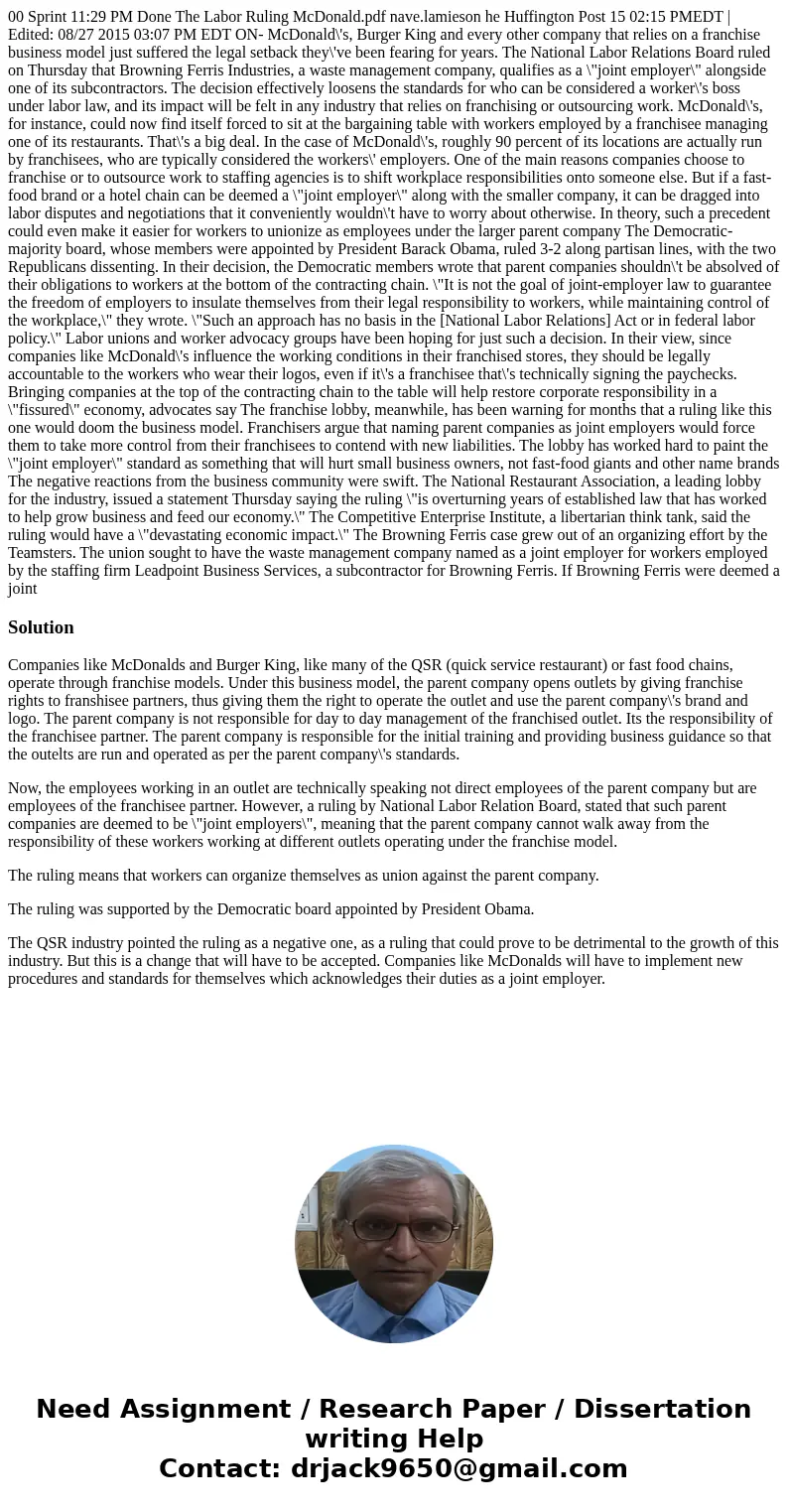00 Sprint 11:29 PM Done The Labor Ruling McDonald.pdf nave.lamieson he Huffington Post 15 02:15 PMEDT | Edited: 08/27 2015 03:07 PM EDT ON- McDonald\'s, Burger King and every other company that relies on a franchise business model just suffered the legal setback they\'ve been fearing for years. The National Labor Relations Board ruled on Thursday that Browning Ferris Industries, a waste management company, qualifies as a \"joint employer\" alongside one of its subcontractors. The decision effectively loosens the standards for who can be considered a worker\'s boss under labor law, and its impact will be felt in any industry that relies on franchising or outsourcing work. McDonald\'s, for instance, could now find itself forced to sit at the bargaining table with workers employed by a franchisee managing one of its restaurants. That\'s a big deal. In the case of McDonald\'s, roughly 90 percent of its locations are actually run by franchisees, who are typically considered the workers\' employers. One of the main reasons companies choose to franchise or to outsource work to staffing agencies is to shift workplace responsibilities onto someone else. But if a fast-food brand or a hotel chain can be deemed a \"joint employer\" along with the smaller company, it can be dragged into labor disputes and negotiations that it conveniently wouldn\'t have to worry about otherwise. In theory, such a precedent could even make it easier for workers to unionize as employees under the larger parent company The Democratic-majority board, whose members were appointed by President Barack Obama, ruled 3-2 along partisan lines, with the two Republicans dissenting. In their decision, the Democratic members wrote that parent companies shouldn\'t be absolved of their obligations to workers at the bottom of the contracting chain. \"It is not the goal of joint-employer law to guarantee the freedom of employers to insulate themselves from their legal responsibility to workers, while maintaining control of the workplace,\" they wrote. \"Such an approach has no basis in the [National Labor Relations] Act or in federal labor policy.\" Labor unions and worker advocacy groups have been hoping for just such a decision. In their view, since companies like McDonald\'s influence the working conditions in their franchised stores, they should be legally accountable to the workers who wear their logos, even if it\'s a franchisee that\'s technically signing the paychecks. Bringing companies at the top of the contracting chain to the table will help restore corporate responsibility in a \"fissured\" economy, advocates say The franchise lobby, meanwhile, has been warning for months that a ruling like this one would doom the business model. Franchisers argue that naming parent companies as joint employers would force them to take more control from their franchisees to contend with new liabilities. The lobby has worked hard to paint the \"joint employer\" standard as something that will hurt small business owners, not fast-food giants and other name brands The negative reactions from the business community were swift. The National Restaurant Association, a leading lobby for the industry, issued a statement Thursday saying the ruling \"is overturning years of established law that has worked to help grow business and feed our economy.\" The Competitive Enterprise Institute, a libertarian think tank, said the ruling would have a \"devastating economic impact.\" The Browning Ferris case grew out of an organizing effort by the Teamsters. The union sought to have the waste management company named as a joint employer for workers employed by the staffing firm Leadpoint Business Services, a subcontractor for Browning Ferris. If Browning Ferris were deemed a joint
Companies like McDonalds and Burger King, like many of the QSR (quick service restaurant) or fast food chains, operate through franchise models. Under this business model, the parent company opens outlets by giving franchise rights to franshisee partners, thus giving them the right to operate the outlet and use the parent company\'s brand and logo. The parent company is not responsible for day to day management of the franchised outlet. Its the responsibility of the franchisee partner. The parent company is responsible for the initial training and providing business guidance so that the outelts are run and operated as per the parent company\'s standards.
Now, the employees working in an outlet are technically speaking not direct employees of the parent company but are employees of the franchisee partner. However, a ruling by National Labor Relation Board, stated that such parent companies are deemed to be \"joint employers\", meaning that the parent company cannot walk away from the responsibility of these workers working at different outlets operating under the franchise model.
The ruling means that workers can organize themselves as union against the parent company.
The ruling was supported by the Democratic board appointed by President Obama.
The QSR industry pointed the ruling as a negative one, as a ruling that could prove to be detrimental to the growth of this industry. But this is a change that will have to be accepted. Companies like McDonalds will have to implement new procedures and standards for themselves which acknowledges their duties as a joint employer.

 Homework Sourse
Homework Sourse